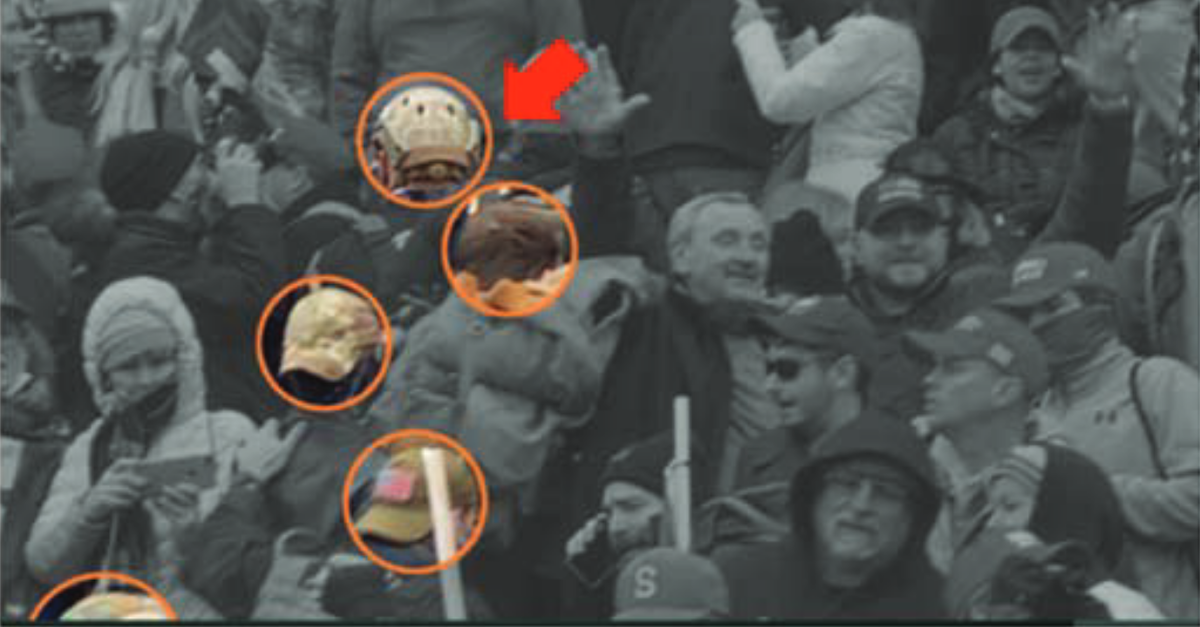
Oath Keepers approach the U.S. Capitol in “stack” formation, prosecutors say in this indictment of nine members. The arrow points to Florida chapter leader Kelly Meggs. (Screenshot from Oath Keepers indictment)
Prosecutors and defendants in one of the two multi-defendant prosecutions against alleged members of the Oath Keepers militia group have asked a federal judge to move the trial from its current April start date, citing concerns over the amount of discovery involved in the case.
Lawyers for Donovan Ray Crowl, Sandra Parker, Bennie Parker, Laura Steele, Connie Meggs, and William Isaacs, along with eight federal prosecutors, submitted the request to U.S. District Judge Amit Mehta on Tuesday, citing a discovery status report filed by prosecutors on Feb. 10.
“Given the unprecedented volume of materials that the government is making available in discovery, and the real need for all parties to be able to search and review these materials prior to trial, the ends of justice that would be served by a continuance substantially outweigh the interests of the public and the defendants in a speedy trial,” the joint motion says.
They were set to go to trial on April 19.
At a status conference on Jan. 25, Mehta, a Barack Obama appointee, resisted objections by the defense lawyers to move the April trial date.
“This case date is going to hold,” Mehta said at the time. “At some point these cases have to go trial … I’m prepared to try in April and I think everybody else needs to get up to speed.”
However, lawyers now say that the amount of discovery is simply too much to effectively manage.
“Following the government’s filing of its discovery status report, the parties have conferred and agree that an April trial date is not tenable. The case-specific discovery materials in this case alone make an April trial date challenging. The government has provided more than two terabytes of discovery materials specific to this case alone. Because the defendants stand charged with conspiring not only with each other but with defendants charged in Criminal Case Nos. 22-cr-15 and 22-cr-14, as well as other uncharged subjects referenced in the discovery materials, this is not a case where defense counsel can ignore materials that, on their face, apply primarily to another defendant. While the defense was provided some of these materials closer to the outset of this case, other materials were made available only recently because they were gathered later in the investigation. For example, Defendant James Beeks was apprehended in late November (very shortly after he was identified by law enforcement as the fourteenth and final member of the group with which these defendants entered the Capitol), and the government is just now completing the review and discovery of evidence from several digital devices seized from Defendant Beeks upon arrest.
Additionally, as described in greater detail in the government’s discovery status report, the government is making an unprecedented volume of materials available through its global discovery. This includes tens of thousands of hours of surveillance video, body-worn camera footage, and public source video; tens of thousands of information and data from tips provided to the Federal Bureau of Investigation (“FBI”) and local police departments; hundreds of internal investigation reports into the conduct of law enforcement on January 6, 2021; hundreds of thousands of FBI reports documenting the investigation of all subjects identified as playing a role in the breach of the Capitol; and data seized pursuant to legal process or consent from thousands of digital devices and other digital accounts of those who participated in the Capitol Breach. The government is making this data available due to the unique circumstances of this matter, i.e., this case encompasses hundreds of similar crimes being committed in the same place contemporaneously, where many defendants recorded their crimes and those of others around them. As defendants are in a better position to determine what evidence they believe is exculpatory and will help in their defense, the government’s plan – to provide the defense with all data that may contain such information, but in a manner that will facilitate search, retrieval, sorting, and management of that information – continues to be reasonable and appropriate. It is especially significant in this case, where the government has already been asked by defense to identify and provide discovery from other cases that defense has deemed as possibly relevant to the preparation of its defense.”
A seventh co-defendant, James Beeks, is not part of the filing, as he was not scheduled to participate in the April 19 trial date.
A second Oath Keepers case, in which the militia group’s founder Stewart Rhodes and 10 others are accused of seditious conspiracy, is set to go to trial in July.
The Oath Keepers is a large but loosely-organized group of right-wing anti-government extremists, according to the Anti-Defamation League. Nineteen alleged Oath Keepers have been charged in at least two multi-defendant prosecutions; indictments against members of the group allege that on Jan. 6, some of them approached the Capitol building in a military maneuver called a “stack formation” as the mob of Donald Trump supporters overran police to swarm the building looking to block certification of Joe Biden as the winner of the 2020 presidential election. One indictment alleges that the group organized a “Quick Reaction Force” ready to bring weapons by boat over the Potomac River at Trump’s direction.
Read the joint motion to continue, below.
[Images via FBI court filings.]